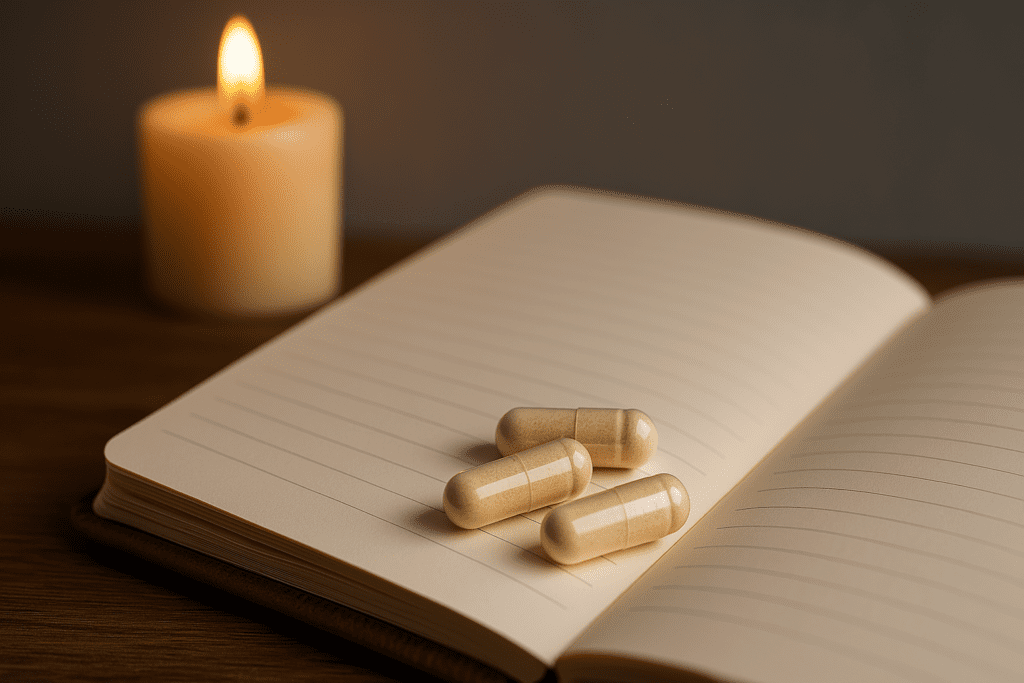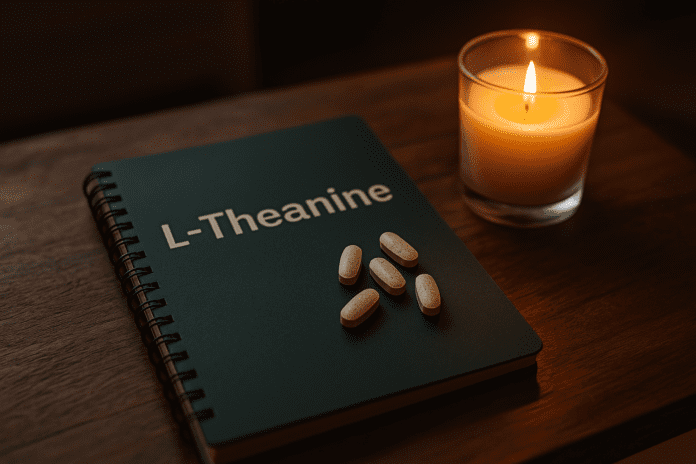In the increasingly fast-paced world of modern life, where chronic stress and cognitive overload have become the norm rather than the exception, interest in natural compounds that support mental clarity and emotional balance has surged. Among these, L-theanine has emerged as one of the most promising amino acids for promoting both relaxation and long-term brain health. Found predominantly in green tea leaves, L-theanine exerts a unique set of effects on the human brain, from calming anxiety to improving focus and potentially supporting neuroprotection across the lifespan. As research deepens, so too does the conversation around appropriate dosing—especially regarding the best L-theanine supplements, how much L-theanine per day is optimal, and what constitutes a safe theanine anxiety dose over the long term.
You may also like: Best Rated Nootropics for Brain Health: Top Supplements to Enhance Focus, Memory, and Longevity
Understanding L-Theanine and Its Role in the Brain
L-theanine is a non-proteinogenic amino acid, meaning it does not contribute to the synthesis of proteins but instead plays a more specialized role in brain biochemistry. Structurally similar to glutamate—a major excitatory neurotransmitter—L-theanine exerts its effects by modulating neurotransmitter activity, including increasing levels of calming GABA, dopamine, and serotonin. These biochemical shifts explain why L-theanine benefits include improved mood stability, enhanced focus, and reduced feelings of stress. The amino acid has been shown to cross the blood-brain barrier, allowing it to interact directly with neural circuits involved in emotion regulation, attention, and memory.
One of the most intriguing aspects of L-theanine is its ability to induce relaxation without sedation. Unlike traditional anxiolytics or sleep aids, which often come with the tradeoff of drowsiness or dependence, L-theanine promotes a state of calm alertness. Electroencephalogram (EEG) studies have revealed that it increases alpha brain wave activity, associated with a relaxed yet attentive mental state. This property makes L-theanine particularly appealing to students, professionals, and aging adults seeking to enhance cognitive performance without sacrificing wakefulness or energy.
Cortisol, Inflammation, and the Stress Response: L-Theanine’s Anti-Aging Role
Chronic psychological stress is one of the most significant accelerators of biological aging. Elevated cortisol levels, driven by sustained activation of the hypothalamic-pituitary-adrenal (HPA) axis, have been associated with increased inflammation, reduced neurogenesis, and even structural brain atrophy in regions like the hippocampus. L-Theanine’s ability to reduce cortisol levels offers a compelling case for its inclusion in anti-aging and longevity-focused supplement regimens.
Multiple double-blind, placebo-controlled studies have demonstrated that individuals who consume L-Theanine—either through green tea or supplementation—experience a measurable reduction in salivary cortisol following exposure to acute stress. This reduction is not merely a psychological effect; it reflects real physiological changes that preserve cellular integrity and limit stress-related damage.In practical terms, L-Theanine may serve as a daily buffer against the slow, cumulative wear of modern life stressors. Whether the stressor is a demanding job, poor sleep hygiene, or emotional overload, L-Theanine offers a physiologically grounded way to disrupt the feedback loop that leads from chronic stress to premature aging.
What makes this effect particularly interesting is the role of inflammation. Cortisol is a known immunosuppressive agent, but chronic stress paradoxically increases pro-inflammatory cytokine activity, including interleukin-6 (IL-6) and tumor necrosis factor-alpha (TNF-α). These inflammatory markers are implicated in the progression of Alzheimer’s disease, cardiovascular conditions, and age-related cognitive decline. Preliminary in vitro studies suggest that L-Theanine can suppress the production of these cytokines in microglial cells—the immune cells of the brain—thereby offering an anti-inflammatory shield that may slow neurodegeneration.
L-Theanine for Anxiety: Mechanisms and Evidence
The use of L-theanine for anxiety has gained traction not only among health enthusiasts but also within clinical settings, where natural interventions for generalized anxiety disorder (GAD) and situational anxiety are in demand. Research has demonstrated that L-theanine can significantly reduce subjective stress responses in acute stress-inducing scenarios, such as public speaking or multitasking under pressure. The effect appears to be dose-dependent, with 200–400 mg theanine showing consistent benefits in human trials. This dosage range has come to be regarded as the most effective theanine anxiety dose for promoting calm without impairing cognitive performance.
One randomized, double-blind, placebo-controlled trial published in the Journal of Clinical Psychiatry found that L-theanine supplementation significantly reduced anxiety and sleep disturbances in individuals with major depressive disorder (MDD). While this suggests broader implications for mood disorders, it also underscores the importance of understanding how much theanine for anxiety is both safe and effective over time. Given that anxiety disorders can persist for years, the long-term implications of using L-theanine daily warrant further study. Nonetheless, current data indicate that doses up to 400 mg per day are well tolerated in healthy individuals.
L-Theanine in the Context of Sleep Architecture
Sleep quality is a key pillar of cognitive longevity, and L-theanine’s role in this domain is often underappreciated. While it is not classified as a sedative, its impact on sleep onset latency, sleep depth, and overall architecture is increasingly being studied. Unlike melatonin, which directly influences circadian rhythms, L-theanine appears to work more indirectly by reducing mental hyperactivity and physiological tension, thereby easing the transition into sleep.
Polysomnographic studies have shown that individuals taking L-theanine experience improved REM and non-REM sleep balance, potentially leading to more restorative sleep cycles. This is particularly relevant for individuals experiencing stress-induced insomnia or fragmented sleep. Rather than pushing the body into unconsciousness, L-theanine gently facilitates the return to natural sleep rhythms, which may have fewer side effects and better long-term outcomes than pharmacological sedatives.
Moreover, combining L-theanine with other natural sleep aids such as magnesium glycinate, glycine, or valerian root may further enhance its sleep-promoting properties. These combinations should be approached with care, ideally under the guidance of a healthcare professional, especially when layering with prescription medications.

Cognitive Enhancement and Neuroprotection
Beyond its calming properties, L-theanine offers compelling nootropic potential. Studies suggest that the compound may support working memory, executive function, and sustained attention—cognitive domains that often decline with age. In young adults, L-theanine combined with caffeine has been shown to improve accuracy and alertness during demanding cognitive tasks, a synergy that has made caffeine and L-theanine pills a popular nootropic stack for productivity. Yet L-theanine alone, without caffeine, continues to show promise for preserving cognitive performance under conditions of stress or fatigue.
More recently, researchers have begun to explore L-theanine’s potential for long-term cognitive support and brain longevity. Preclinical studies have indicated that it may reduce oxidative stress, inflammation, and excitotoxicity—three mechanisms that contribute to neurodegenerative diseases such as Alzheimer’s and Parkinson’s. These findings suggest that daily supplementation with the best theanine supplement may not only soothe anxiety but also protect against cognitive decline. However, determining how much L-theanine should you take for sustained brain health remains an open question, especially when balancing short-term performance with long-term safety.
Extended Use in Older Adults: Preserving Cognitive Function Into Later Life
While most L-Theanine marketing targets students and busy professionals, the compound may hold even greater promise for older adults seeking to maintain mental acuity. As the population ages, there is growing interest in safe, affordable interventions that can help mitigate age-related cognitive decline without the side effects associated with prescription medications.
Several rodent studies have demonstrated that chronic L-Theanine administration improves working memory and spatial learning in aging rats. These effects were correlated with increased hippocampal neurogenesis and reduced oxidative stress markers in brain tissue. Human studies, though more limited, have shown similar trends. A randomized clinical trial in older adults showed that daily L-Theanine supplementation improved scores on cognitive flexibility and attention-switching tasks after 12 weeks.
These findings are particularly important because they point to a potential role for L-Theanine not just in enhancing cognition, but in preserving it. The compound’s antioxidant properties help protect neural cells from damage caused by free radicals—a key mechanism behind many forms of dementia. Moreover, its ability to reduce stress and improve sleep can further enhance brain health by reducing the cumulative impact of neuroinflammation and sleep fragmentation, both of which are common in older populations.
Optimal Dosage: How Much L-Theanine Per Day Is Safe and Effective?
When considering how much L-theanine can you take in a day, individual needs and health goals become key factors. Clinical studies have used a wide range of dosages, from as little as 50 mg to as high as 900 mg per day, though most research and practical use tend to center around 100 to 400 mg. For daily stress management and cognitive support, many experts suggest that 200 mg once or twice daily is sufficient. For individuals with more pronounced anxiety, a theanine anxiety dose of up to 400 mg—taken either as a single dose or divided throughout the day—has shown effectiveness without notable side effects.
The question of whether 400 mg theanine is excessive often arises, but current data support its safety in most populations. Unlike many pharmaceutical anxiolytics or stimulants, L-theanine does not appear to cause dependency or withdrawal symptoms. So, is L-theanine addictive? Research to date indicates it is not, further supporting its suitability for daily, long-term use. However, because individual tolerance and sensitivity can vary, starting at a lower dose and gradually increasing may help optimize results while minimizing potential digestive or neurological side effects.
Timing and Frequency: When Is the Best Time to Take L-Theanine?
Another commonly asked question is when is the best time to take L-theanine. The answer largely depends on the purpose of supplementation. For calming pre-sleep anxiety or improving sleep quality, taking L-theanine at night—typically 30 to 60 minutes before bed—can be beneficial. For those looking to enhance daytime focus and stress resilience, morning or mid-day dosing may be more effective. Some individuals opt for split dosing, taking half in the morning and half in the evening, to maintain steady-state blood levels throughout the day.
As for how long does L-theanine stay in the body, its half-life is estimated to be around 2.5 to 4.5 hours, though subjective effects may persist longer due to its influence on neurotransmitter systems. This relatively short half-life supports the rationale for divided dosing in individuals seeking prolonged benefits. Importantly, because L-theanine works subtly rather than dramatically, it may take several days of consistent use to notice its full range of cognitive and emotional effects.
Pregnancy, Breastfeeding, and Safety Considerations
The safety of L-theanine while pregnant or breastfeeding remains a matter of clinical caution. Although green tea, which naturally contains L-theanine, has long been consumed during pregnancy, the concentrated doses found in supplements raise additional questions. Is L-theanine safe while pregnant? Current evidence is limited, and while no major teratogenic effects have been observed in animal studies, human data remain sparse. Thus, individuals who are pregnant or breastfeeding should consult a healthcare provider before beginning supplementation. The same prudence applies when asking, can you take L-theanine while pregnant or is L-theanine while breastfeeding advisable. Given the heightened sensitivity during these life stages, conservative guidance is recommended.
Still, some clinicians believe that under medical supervision, low-dose L-theanine (typically under 200 mg per day) may be acceptable for managing anxiety during pregnancy when other options are contraindicated. This perspective emphasizes the need for individualized decision-making and underscores that while theanine pregnancy use may offer benefits, it should never replace medical advice or treatment when necessary.
Choosing the Best L-Theanine Supplements for Efficacy and Safety
With a growing number of options available on the market, identifying the best L-theanine supplements can feel overwhelming. To ensure both quality and efficacy, it is essential to choose products that are third-party tested and made with pure L-theanine, ideally in the form of Suntheanine—a patented and clinically studied version that mirrors the compound found in tea leaves. The best L-theanine brand will often disclose exact dosages, avoid unnecessary fillers, and provide transparent information about manufacturing practices.
In evaluating the best theanine supplement, consumers should also consider whether the product includes synergistic compounds such as magnesium, GABA, or vitamin B6, which may enhance L-theanine’s calming and cognitive benefits. However, it’s important to verify that these combinations are supported by clinical data, especially if targeting specific outcomes such as anxiety reduction or cognitive enhancement. Reviews and user testimonials can provide useful anecdotal insight, but they should never replace evidence-based analysis.

Synergy with Other Nootropics and Adaptogens
L-theanine is often studied in isolation, but its effects can be amplified or modulated through combination with other cognitive enhancers. One of the most well-known pairings is L-theanine with caffeine, a stack that enhances alertness while smoothing the jittery edge of stimulants. However, newer combinations are now being studied, particularly those involving adaptogenic herbs such as ashwagandha, rhodiola rosea, and bacopa monnieri.
These compounds share overlapping but distinct mechanisms with L-theanine. Ashwagandha, for example, helps regulate the HPA axis and reduce cortisol, much like L-theanine, while also promoting physical endurance. Rhodiola can enhance mitochondrial function and resilience under fatigue. Bacopa is known for memory enhancement and antioxidative effects. When combined thoughtfully, these agents may provide a synergistic boost to mood, focus, and stress resilience. Understanding the specific biochemical pathways of each allows for more strategic stacking—an approach increasingly favored by biohackers and clinicians aiming for personalized nootropic solutions.
Long-Term Use and Potential Side Effects
Although L-theanine is widely regarded as safe, even with prolonged use, questions remain regarding cumulative effects over time. How much L-theanine can you take in a day without risking long-term health consequences? Most studies suggest that daily doses up to 400 mg are not only effective but also safe for extended use, particularly in otherwise healthy adults. That said, individuals taking medications that affect blood pressure or neurotransmitters should be aware of potential interactions. For instance, does theanine lower blood pressure? While it may have a mild hypotensive effect, especially in individuals with elevated baseline levels, the effect is generally not strong enough to cause concern unless paired with other medications.
As always, vigilance around potential side effects—however rare—is wise. These may include headaches, gastrointestinal discomfort, or dizziness in sensitive individuals. Most of these symptoms resolve with dosage adjustments or discontinuation. Notably, L-theanine is not known to produce withdrawal symptoms or tolerance buildup, making it a uniquely sustainable option for those looking to support mental clarity and emotional resilience in the long term.
Frequently Asked Questions: L-Theanine for Brain Health, Anxiety, and Long-Term Support
1. Can taking L-Theanine every day lead to tolerance or dependency?
L-Theanine is widely considered non-addictive, and there is no clinical evidence to suggest that long-term use leads to tolerance or physical dependence. Unlike many pharmaceuticals used for anxiety, such as benzodiazepines, L-Theanine does not alter receptor structures in a way that typically causes withdrawal. In fact, many users report consistent benefits from taking L-Theanine 400mg daily over extended periods without needing to increase their dosage. However, it’s always a good practice to monitor effectiveness and consult with a healthcare professional if the desired effects begin to diminish. If you’re asking, “is L-Theanine addictive?”—current science indicates that it is not.
2. How much L-Theanine should I take if I’m using it for long-term cognitive support?
The optimal dosage varies depending on individual needs, but for sustained brain health and cognitive longevity, a daily dose of 200 to 400 mg is commonly used. Studies suggest that this range supports neurogenesis, attention span, and memory, especially when combined with mindfulness practices or cognitive training. When people ask “how much L-Theanine should I take” for preventative wellness, 400 mg Theanine per day is often ideal. This dose supports stress reduction without causing sedation, making it suitable for daytime use. Regular intake can enhance focus and emotional regulation, even for individuals who are not experiencing acute anxiety.
3. Does L-Theanine help with anxiety if taken during stressful periods only?
Yes, L-Theanine can be effective even when used situationally. If you’re asking, “does L-Theanine work for anxiety in the moment?” research shows that its calming effects begin within 30 to 60 minutes after ingestion. While daily use offers cumulative benefits, using it during acute stress—such as public speaking, exams, or conflict situations—can still be highly effective. The ideal theanine anxiety dose for these situations ranges from 200 to 300 mg, although some prefer a split dose. That said, individuals with chronic anxiety may benefit more from consistent daily use, especially when combined with lifestyle interventions such as exercise or breathwork.
4. What is the best L-Theanine dosage for anxiety relief without causing drowsiness?
The key is to stay within the optimal therapeutic range while avoiding excessive sedation. A typical L-Theanine dosage for anxiety is 200 to 400 mg per day, often split into two doses. If you’re wondering how much Theanine for anxiety is best without feeling sleepy, 200 mg in the morning and 200 mg mid-afternoon tends to support calm alertness. This approach is ideal for people who need to stay productive but want to manage anxious thoughts. Those particularly sensitive to calming supplements may want to start with a lower dose and adjust upward based on their personal response.
5. Is L-Theanine safe to take while pregnant or breastfeeding?
The question “can you take L-Theanine while pregnant?” is increasingly common, and the answer is nuanced. While animal studies and traditional green tea use suggest safety, there is limited clinical research on L-Theanine during pregnancy in humans. Because of this, most healthcare providers recommend caution. If you’re exploring L-Theanine while pregnant or L-Theanine while breastfeeding, it’s important to consult a provider who can assess the benefits relative to your unique health profile. Anecdotally, many women use lower doses—such as 100 mg—and report reduced anxiety without adverse effects, but always proceed under medical supervision.
6. Does L-Theanine lower blood pressure and is it safe for people with hypotension?
L-Theanine has been shown in clinical studies to modestly reduce blood pressure, particularly in individuals with elevated stress levels. If you’re asking, “does Theanine lower blood pressure?”—yes, but typically only to a mild degree. This can be beneficial for people with hypertension but may require caution for those with low resting blood pressure or those on antihypertensive medications. Before starting L-Theanine 400mg daily, individuals with cardiovascular concerns should monitor their blood pressure and consult a healthcare professional. A tailored dose such as 100–200 mg may be more appropriate in those cases.
7. What is the best L-Theanine brand or supplement form for maximum absorption?
When considering the best L-Theanine supplements, look for products that use Suntheanine®, a patented form known for its purity and bioavailability. Whether in capsule, chewable, or powder form, the best Theanine supplement often depends on personal preference and ease of use. Some brands combine L-Theanine with magnesium, GABA, or adaptogens to enhance its calming effects. If you’re shopping for the best L-Theanine brand, prioritize those that provide third-party testing and avoid unnecessary fillers. Always verify that the supplement offers clear dosage labeling—especially if you’re targeting L-Theanine 400mg for cognitive support.
8. When is the best time to take L-Theanine for different health goals?
Timing matters depending on your intended outcome. If you’re wondering whether to take L-Theanine morning or night, it depends on your goal: take it in the morning to enhance focus, or before bed to improve sleep quality. For example, a morning dose can synergize with caffeine for improved alertness, while a nighttime dose can reduce sleep onset latency. Many users also split their dose—taking 200 mg in the morning and 200 mg at night. This strategy supports both calm productivity and restorative sleep, making it ideal for long-term cognitive support.
9. How long does L-Theanine stay in the body, and can it accumulate over time?
L-Theanine is absorbed within 30–60 minutes and has a half-life of around 3–4 hours. It does not accumulate in body tissues, so it doesn’t build up with repeated use. However, the question of “how long does L-Theanine stay in the body” is important for those planning their dosage schedule. The calming effects usually last about 6–8 hours, which supports twice-daily dosing. Since it’s water-soluble and excreted via the kidneys, it’s considered very safe for daily, long-term use when taken within the recommended range.
10. What happens if I take more than 400 mg of L-Theanine in a day?
While doses higher than 400 mg Theanine are sometimes used in clinical settings, there’s limited data on the safety of such high intake over long periods. If you’re asking “how much L-Theanine can you take in a day,” most experts suggest staying below 1,200 mg unless under professional supervision. Exceeding the typical dosage range may result in excessive sedation, reduced motivation, or gastrointestinal discomfort. For most people, the sweet spot remains between 200 and 400 mg daily, depending on their stress levels and metabolic rate. As with all supplements, more isn’t always better—consistency and quality matter more than quantity.

Conclusion: L-Theanine for Brain Longevity, Anxiety Relief, and Daily Cognitive Support
As interest in natural solutions for mental health and cognitive longevity continues to rise, L-theanine stands out for its versatility, safety profile, and evidence-backed efficacy. From its ability to enhance calm without sedation to its emerging role in protecting brain health over time, L-theanine offers a unique pathway to both immediate relief and enduring resilience. When used wisely—whether in a 200 mg morning dose for focus or as a 400 mg theanine evening supplement for stress relief—this amino acid can become a valuable tool in a holistic brain health regimen.
Knowing how much L-theanine per day is optimal depends on a blend of science, individual need, and practical experience. For those navigating chronic stress, anxiety, or age-related cognitive decline, asking how much L-theanine should I take becomes more than a dosage question—it becomes part of a broader strategy for long-term well-being. And with careful consideration of safety during sensitive periods like pregnancy or breastfeeding, even questions like is L-theanine safe for pregnancy or can you take L-theanine while pregnant can be addressed with clarity and caution.
Ultimately, selecting the best L-theanine brand and understanding when and how to take it empowers individuals to make informed, evidence-based decisions about their mental and neurological health. Whether for short-term focus or lifelong cognitive preservation, L-theanine continues to offer compelling benefits—calmly, effectively, and sustainably.
natural anxiety relief, calming amino acids, brain-boosting supplements, cognitive enhancement strategies, natural focus enhancers, stress management supplements, green tea extract benefits, nootropic supplement guide, adaptogens for anxiety, emotional resilience support, mental clarity boosters, supplements for brain longevity, holistic anxiety solutions, daily mood support, neuroprotective supplements, safe supplements during pregnancy, postpartum anxiety support, cognitive support while breastfeeding, stress relief for professionals, herbal supplements for mental health
Further Reading:
10 Health Benefits of L-Theanine Supplements (Side Effects + Dosage)
Disclaimer
The information contained in this article is provided for general informational purposes only and is not intended to serve as medical, legal, or professional advice. While Health11News strives to present accurate, up-to-date, and reliable content, no warranty or guarantee, expressed or implied, is made regarding the completeness, accuracy, or adequacy of the information provided. Readers are strongly advised to seek the guidance of a qualified healthcare provider or other relevant professionals before acting on any information contained in this article. Health11News, its authors, editors, and contributors expressly disclaim any liability for any damages, losses, or consequences arising directly or indirectly from the use, interpretation, or reliance on any information presented herein. The views and opinions expressed in this article are those of the author(s) and do not necessarily reflect the official policies or positions of Health11News.


